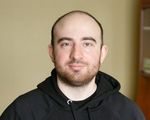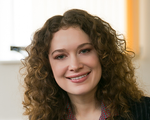About Success Builder
How do you find your place in life? How do you find something to do that both comes naturally to you and makes you happy? The answer is that you have to apply the knowledge you’ve gained from university and from life itself correctly. The Success Builder Project features HSE University graduates who have discovered themselves through an interesting business or an unexpected profession. The protagonists share their experiences and lessons learnt and talk about how they’ve made the most of the opportunities they were given.
Sergey Korotkikh, graduate of Faculty of World Economy and International Affairs, now manages consulting for CAG and teaches at HSE University. He has managed to make mentoring not only his profession but also his mission. In this interview with Success Builder, he explains how students can get the most from a university, the true meaning of ‘agile’, how to raise a new generation of managers and how goal-setting skills help in life.
How did your life at HSE begin?
I lived in Voronezh and found out in the 9th grade that HSE ran a regional University Preparation Centre in our city. Before that, I had been thinking about going to MGIMO, but when I attended the Centre, I realised that HSE is more interesting and modern and that it produces great specialists. I took part in various Academic Olympics and won First Place in social studies and economics. This gave me the right to enter any HSE economics programme without taking entrance exams. I chose the World Economy in FWEaIA [the Faculty of World Economy and International Affairs – Ed.] because it offered the additional opportunity to study Chinese.
When I went to Moscow to submit my documents for admittance, I took them only to the World Economy programme at HSE University and did not even consider other options. My first-year courses were held at the campus on Pokrovka Street. I was inspired, motivated and full of enthusiasm. From the very first month, I volunteered at international events, and this later played a major role in my development.
Students should generally immerse themselves in the social environment of the university, city and country from the very start of their studies because it develops innumerable skills and useful connections. In fact, my management experience began when I supervised a team of volunteers at the Winter Olympics in Sochi.
I interned at McKinsey as I completed my bachelor’s. I hadn’t planned to pursue a consulting career and only learned of the field from a friend at HSE, but my experience turned out to be relevant and I passed the selection process.
Speaking from years of experience, I would say that discipline is essential for students who want to get the most out their university experience
Looking back on my student days, one word comes to mind: discipline. And now as an HSE teacher, I tell my students to focus on formalities and finish what they start. Every day at HSE, I passed by a poster with the word DISCIPLINE in large letters on it. This motivated me and was a good reminder that I had to stay sharp and focused on the goal.
What else, in your opinion, played a role in your success as a student?
My undergraduate years were a special time when I could completely immerse myself in learning new things, get to know incredibly talented and outgoing classmates, not think about grades, results and achievements, and just enjoy living in the moment. That’s why I think that being fully engaged in your studies is key for any student. It always brings results.
ЧAs a teacher, what advice do you give to your students?
Along with delivering lectures and seminars, I am working on a hypothesis to create an educational platform that will help students better navigate the changing world. In a sense, this is the digitisation of my accumulated experience at HSE in mentoring and coaching — that I carry out with the heads of various organisations —to develop students’ goal-setting skills. To succeed at anything, you first have to understand what you are trying to accomplish. I often ask students to forget about grades and focus only on what useful thing they want to take away from each course so that they can derive maximum benefit from their teachers’ knowledge and experience. Knowing how to set goals is important in life in general because it is very useful to know your worth and what you want to bring to this world.
Today’s students often fail to understand the purpose of the knowledge they are obtaining, how and where to apply it and what benefit it will bring
How can you develop the awareness that by coming to every class — even one that you do not understand at all — you gain a certain benefit that will invariably pay off later? After all, that is far from obvious right now. Nevertheless, if you try to convert everything that the teacher says into a certain set of tools for use in life, then the amount of knowledge and skills that the university provides is enormous. The most important thing is to be able to define your life mission, after which it is only a matter of time until you can make use of those tools.
Why did you stay at HSE and choose a master’s programme in the same faculty? Didn’t you want to try something new?
I realised in my undergraduate years that life was leading me along and that my only job was to figure out how I could best follow that path. I wanted a master’s programme with an active student environment and that would enable me to improve my professional and academic qualifications — especially because I would earn a full scholarship if I scored high enough on my entrance exams.
The choice of a master’s programme was simple. At first, I wanted to follow through with a childhood dream of attending MGIMO, but then I realised that it did not match the career path I had chosen. HSE University offered a much wider range of suitable programmes and I had already come to appreciate the unique culture the university offered. What’s more, I saw an opportunity to develop my relationship with the department because I could become a teacher there!
As a high school student, I never even considered the possibility of applying to foreign universities because, honestly, I didn’t have a clear example of how it was done or what was required. Plus, I lacked the resources for it then. As a result, I remained at the World Economics faculty specialising in Global Management and Finance — where I continue working to this day.
How did working at McKinsey help your career and why did you leave consulting?
To a certain extent, it provided me with a new and important environment. This is what shapes us as individuals, and in this sense, McKinsey is exactly the right place to be. It is a community of experienced and well-rounded people, strong communicators and first-rate mentors.
The McKinsey setting allowed me to be creative and overcome my self-imposed limitations. My first project was a complete failure, but a senior colleague said, ‘It’s great that you tried. Now keep going!’ It was wonderful realising that a negative experience brings new insights into things, as well as into yourself, and sometimes we face tasks for which there are no definite answers, but they need to be accomplished regardless. Then came several interesting and successful projects that led me to work in the public sector because I have long wanted to do something of significance for the country.
In addition to practical skills, the company helped me develop a sense of style and taste, the ability to communicate with people at different levels and to be attentive to others’ feelings. All this, in general, compelled me to understand that there are different cultures of human interactions, and it became interesting to promote new approaches, such as ‘agile’.
What exactly is ‘agile’ and why is it so popular now?
For me, ‘agile’ is a particular approach to team interactions and decision-making. It could partly be called a culture or even a work philosophy that includes many different techniques and tools — SCRUM, Kanban, SAFe, LeSS, XP and so on. Building relationships with employees is based on the principle of the team’s self-organisation. This requires maturity and the ability to determine priorities correctly and quickly, and that are consistent with the overall strategy.
In ‘agile’, the main thing for all participants is understanding the goal and their place in the chain of actions towards achieving it — not the fact that you’re at work from 9 ‘till 6 or the number of tasks you performed: just the result and the feedback on it.
Let’s say we worked on a project for two weeks. What did we accomplish? Did we achieve the desired effect? Did it change the world around us? You need to constantly check your activities against these parameters and make adjustments so that, in the end, you can answer these questions in the affirmative as much as possible. What interested me most about ‘agile’ was the team communication aspect that has a major effect on work results. For example, I feel more comfortable working in the context of ‘value leadership’, which gives rise to employees’ self-organisation and sense of responsibility. Such an environment creates the possibility for self-realisation. In my opinion, ‘agile’ arose because the market needed new tools and approaches for testing product hypotheses quickly and, in a rapidly changing world, the old sequential approach had become less effective.
Where can ‘agile’ be applied — in education, government? How will it help?
‘Agile’ can be applied in different areas to align an organisation’s various management levels. However, it is important to note that there is no advantage to or need for applying it everywhere. At CAG, my team and I accumulated a lot of experience in improving management in various organisations, and my main conclusion was that all approaches and tools should serve a specific purpose and develop a specific strategy.
First, it should push employees and managers towards trust, openness, a willingness to accept other people’s ideas and the ability to see their own mistakes as experience. This paradigm multiplies an organisation’s effectiveness.
What problems with management exist in Russia?
Knowledge becomes obsolete very rapidly these days, so in a sense, the current managers in business and government possess a lot of baggage from outdated knowledge and skills. There is also the generational problem: older employees are always more conservative than younger staffers, who tend to go full tilt on everything. In a sense, their behaviour patterns do not suggest flexible views and decisions. They find it more difficult to cope with criticism and, as digital tools and open communication continue to develop, it creates a certain imbalance between soft and hard skills.
Therefore, the key task for modern education — whether a university or continuing education centre — is to retrain managers by showing them new horizons of what is possible and transforming their thinking through examples. And young professionals must learn how to convey their thoughts clearly, understand their responsibilities and develop emotional intelligence.
We need to educate a new generation of Russian managers who will be able to think more broadly and will not be afraid to experiment and make mistakes
In my understanding, the ideal state is a service model designed to provide a high-quality environment for its citizens’ development. The state’s task is to regulate all areas of life carefully, provided it understands the needs of the end-user — the citizen. Personally, I set a rather global goal — that of creating conditions for developing global leaders and managers, conditions in which you can make mistakes, learn from this experience and try again by looking at the problem from a different angle.
How did you become involved in the public sector?
In 2017, I was invited to help develop the Russian Housing Sector Development Strategy through 2024, which is now published on the Ministry of Construction, Housing and Utilities website. I was primarily interested in the scale and purpose of the project. After this success, I worked on government projects constantly. This led to work on the Strategy for Russia, and then the Strategy for Uzbekistan. This cooperation with government agencies helped me better understand the challenges in this area and the opportunities that existed for doing something to improve the country.
‘Strategy’ is a keyword in your portfolio. How does one become a professional strategist?
Strategy is related to the vision of the goal, and this is very important in all processes. Based on my experience with different projects, I have formulated techniques that help identify the goal and the steps towards it, and this is important at any level — in small, medium and large businesses, government and personal development. At HSE, I learned how to structure information well, how to ‘package’ the client’s objectives into a clear and achievable idea.
As a rule, a strategy consists of an analysis of several aspects such as vision, mission, goals, the organisation’s values and its challenges and opportunities based on available resources and market trends. Having a well-defined development plan helps a company provide clear motivation for employees, which makes their work much more effective and meaningful. I am gradually balancing the number of business and state organisations in the portfolio of companies that I work with because it is important to gain experience in both areas.
I often conduct strategic sessions for business owners designed to take them to a new level of thinking, to determine what they really want from their business and why they need it. As a result, many owners changed their approach to management and their companies achieved 10-20 times greater annual revenues. And it was all simply because they understood why.
Setting the right goals always leads to good results, especially in cases where the business has already achieved its initial goal and must revise its strategy to scale up, or else change the conceptual paradigm to reach new levels. That stage might require a new structure, processes or product line — the very things for which a strategist is needed.
How did you study human behaviour and psychology?
Before entering the master’s programme, I thought about changing my profile and becoming a psychologist. But my decision to pursue an education in economics turned out to be the right choice because it gave me a broader understanding of how the world works. But I still dabble in psychology. I have always liked communicating with people, asking questions, listening and trying to understand and expand my vision of the situation from different sides. This has helped develop my emotional intelligence, especially empathy, with the help of which I began to understand people’s character better and how it influences the decisions they make.
Now I work with different people and companies as a strategist and coach. I am currently in the process of earning my international ICF certification. In general, coaching helps you structure your life experience into applied business tools. My combination of skills in psychology, management, analytics, plus a certain degree of creativity, is what gives me a unique professional competence in my field.
What is the Center for Advanced Government where you work?
The Center was created by governance and data management experts, along with researchers who decided to help those who want to apply best practices in management to the new digital reality.
CAG studies and analyses the factors and conditions pertaining to governance: political platforms and difficulties in building trust between the managerial elite, society and business. Based on this data, we formulate ways to overcome the barriers to implementing the planned reforms without causing political shock. In effect, we implement operational and strategic consulting projects to introduce best management practices into the activities of government agencies and other organisations. This year, we plan to launch an accelerator for ideas, projects and teams to give a green light to the implementation of new management practices.
What is your calling?
When people ask me what I do, an hour-long monologue follows. I am essentially a mentor but I understand that to give advice, you need to have a lot of life experience and a certain position in society. Still, I try to gather people around myself whom I support and promote, for example, as part of the HSE mentoring programme.
In my opinion, this is a purely Russian phenomenon — legitimising the search for oneself through professions. Western employers don’t appreciate a portfolio in which, after graduating from the university, the applicant has worked in multiple companies on a host of projects, instead of staying with a single well-known brand. How did Russians come to have such a liberal option?
I think it has to do with historical continuity. As a rule, large corporations in the West are family-owned. For a Westerner, the history of a family name, a dynasty, the stability of a business and reputation and the components of an environment for transmitting positive experience. Children are imbued with this continuity and focus on the family from an early age.
Unfortunately, our country has had a series of revolutions, wars and crisis over a very short period, which left us with very little continuity. We are searching for ourselves, which is normal. I am glad that we are now in a period of some stability, which makes it possible to pass along experience and values to the next generation.
For me, one of the most important tasks in life is to record my experience as fully and effectively as possible so that I can pass it on to others. That is why I teach: for me, it is an incredibly valuable opportunity to convey to a younger generation the values and skills that can lay the foundation of a new professional culture and enable them to go through life with the knowledge that I did not have.













































































































































